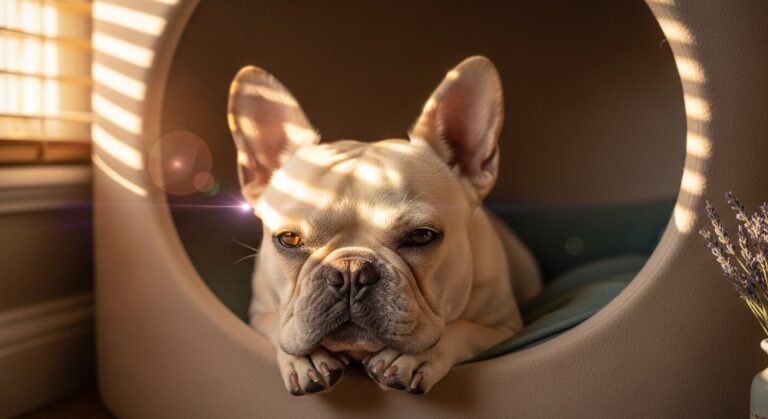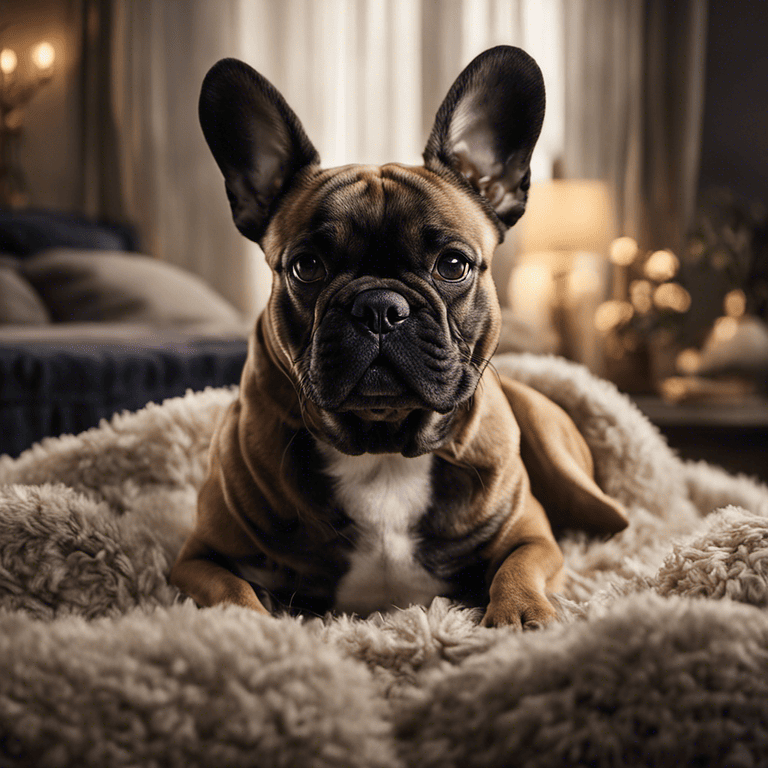French Bulldogs, with their distinctive snorts and undeniable charm, are beloved companions. Yet, their pronounced love for sleep often leaves new and seasoned owners alike pondering: why do French Bulldogs sleep so much? Far from a sign of laziness, their extensive rest—averaging 12-14 hours a day—is a fundamental aspect of their unique biology, essential for their physical health, mental well-being, and overall quality of life. Understanding the intricacies of French Bulldog sleep patterns is not just about curiosity; it’s about providing an environment that supports their specific needs and ensures a happy, healthy future for your furry friend.
Key Takeaways
- French Bulldogs typically sleep 12-14 hours daily, essential for their health, not a sign of laziness.
- They engage in polyphasic sleep, characterized by shorter, more frequent naps throughout the day.
- Their brachycephalic structure impacts breathing and thermoregulation, increasing their need for restorative sleep.
- Factors like age, activity level, environment, and underlying health conditions significantly influence sleep patterns.
- Creating an optimal, secure, and comfortable sleep environment is crucial for their overall well-being.
Why French Bulldogs Sleep So Much: The Biological Imperative

The perception that French Bulldogs are simply lazy because they spend two-thirds of their day asleep couldn’t be further from the truth. Their extensive sleep requirement, typically between 12 and 14 hours over a 24-hour cycle, is deeply rooted in their unique biology and physical characteristics. This breed’s compact size and often lower energy expenditure mean they don’t always need long, sustained periods of activity like larger, more athletic breeds. However, their need for restorative rest is heightened by other factors unique to their breed.
One of the primary biological reasons for their sleep habits stems from their brachycephalic skull structure. This characteristic, while giving them their adorable flat faces, also predisposes them to common French Bulldog breathing issues. The effort required for basic functions like breathing and thermoregulation can be significantly higher than in dolichocephalic (long-nosed) breeds. Adequate sleep allows their respiratory system to rest and recover, minimizing stress on their airways. Furthermore, the recovery from even moderate French Bulldog exercise needs and activities necessitates substantial rest, helping them recharge both physically and mentally. This necessary downtime is not just about resting muscles; it’s about repairing tissues, consolidating memories, and maintaining hormonal balance, all crucial for a Frenchie’s overall vitality.
The Science of French Bulldog Sleep: Polyphasic Cycles & Brain Health
Beyond simply needing more hours of sleep, French Bulldogs often exhibit distinct sleep patterns. Unlike humans or some other animals that primarily engage in monophasic sleep (one long sleep period), French Bulldogs are often described as having polyphasic sleep cycles. This means their sleep is broken into shorter, more frequent bouts throughout the day and night, rather than one continuous stretch.
These shorter sleep sessions, which might last around 25-30 minutes, allow them to enter deep rest quickly and wake up feeling refreshed. While they may still have a longer continuous sleep period at night, these interspersed naps are vital. Polyphasic sleep is a survival adaptation seen in many animals, enabling them to quickly regain energy while remaining somewhat alert to their surroundings. For French Bulldogs, this translates to bursts of playful energy followed by periods of deep, rejuvenating sleep. Moreover, sleep plays a critical role in brain health, aiding in memory consolidation and learning, which is particularly important during French Bulldog training success and puppy development.
Common French Bulldog Sleep Behaviors: From Burrowing to Snoring

French Bulldogs are known for their endearing and sometimes amusing sleep behaviors. Observing these patterns can tell you a lot about your Frenchie’s comfort and well-being.
The Burrowing Instinct
Many French Bulldogs possess a strong, instinctual desire to burrow under blankets, pillows, or even clothing piles. This behavior provides them with a profound sense of security, warmth, and comfort. It mimics the safety of a den, a primal instinct for canids. Providing a soft, cozy bed with blankets allows them to indulge this natural inclination, fostering a peaceful and secure sleeping environment.
The Symphony of Snoring
Due to their brachycephalic anatomy, snoring is a very common, almost signature, trait of French Bulldogs. While often harmless and part of their charm, excessive or sudden, very loud snoring, especially accompanied by gasping or pauses in breathing, can be a symptom of more serious common health issues in French Bulldogs like Brachycephalic Obstructive Airway Syndrome (BOAS). It’s crucial for owners to differentiate between normal Frenchie snores and potential signs of respiratory distress, consulting a vet if concerned.
Twitching and Dream States
Like humans, dogs experience various sleep stages, including REM (Rapid Eye Movement) sleep, where dreams occur. You might observe your French Bulldog twitching their paws, vocalizing softly, or making slight facial movements during these deep sleep phases. These are usually normal signs of dreaming and indicate a healthy sleep cycle. It’s generally best not to wake a dreaming dog abruptly.
Factors Influencing French Bulldog Sleep: Age, Health, & Environment
While the 12-14 hour average is a good guideline, several factors can significantly impact your French Bulldog’s sleep patterns and needs. Understanding these influences is key to supporting their rest.
Age-Related Sleep Needs
- Puppies: French Bulldog puppies are like human babies; they need an immense amount of sleep, often up to 18-20 hours a day, broken into frequent naps. This sleep is crucial for their rapid development, learning, and growth. Establishing a consistent crate training French Bulldog guide and sleep schedule early on is vital.
- Adults: Adult French Bulldogs settle into the typical 12-14 hour range, balancing play, mental stimulation, and rest.
- Seniors: As French Bulldogs age, their energy levels may decrease, and they often require more sleep, similar to puppies. However, increased sleep in seniors can also be a sign of underlying health issues, so monitoring changes is important. Consider tailored French Bulldog diet for seniors to support their aging bodies.
Health Conditions
Various health issues can disrupt or alter a French Bulldog’s sleep. Conditions like arthritis, dental pain (see French Bulldog dental care), allergies, or even digestive upset can make it difficult for them to find comfortable rest. More seriously, undiagnosed BOAS can lead to fragmented sleep and chronic fatigue due to obstructed breathing. If you notice significant changes in your Frenchie’s sleep habits or signs of discomfort, a veterinary check-up is always recommended.
Diet and Nutrition
What your French Bulldog eats can directly impact their sleep quality. A balanced diet, appropriate for their age and activity level (refer to Master Guide French Bulldog Food 2025), provides the necessary energy and nutrients without causing digestive distress that could disrupt sleep. Avoiding heavy meals close to bedtime can also promote better rest.
Exercise and Mental Stimulation
While French Bulldogs don’t require marathon runs, adequate French Bulldog exercise blueprint and mental stimulation are crucial. A tired Frenchie, both physically and mentally, is a good sleeper. Short, regular walks and mental stimulation toys can help burn off excess energy and satisfy their curious minds, leading to more restful sleep. Conversely, too much activity too close to bedtime can overstimulate them.
Environmental Factors
Temperature, noise, and light levels in their sleeping area are significant. French Bulldogs are sensitive to extreme temperatures; they can overheat easily in warm climates and feel the cold keenly. A quiet, dimly lit, and temperature-controlled space is ideal. Their strong desire for companionship also means they often sleep best when near their human family, even if not directly on the bed. For travel, maintaining a consistent routine is important when safely traveling with your French Bulldog.
Creating the Optimal Sleep Environment for Your Frenchie

Ensuring your French Bulldog gets quality sleep involves thoughtful consideration of their sleeping arrangements. A comfortable, safe, and consistent environment is paramount.
- Comfortable Bedding: Invest in a high-quality, orthopedic dog bed that supports their joints, especially crucial for preventing issues like preventing joint issues in French Bulldogs. Frenchies often appreciate beds with raised edges or bolsters they can lean against, fulfilling their burrowing instinct.
- Temperature Control: Keep their sleeping area at a comfortable, moderate temperature. French Bulldogs are prone to overheating, so ensure proper ventilation in warmer months. In colder seasons, provide extra blankets for burrowing, but avoid direct drafts.
- Quiet and Dark Space: Minimize noise and light disruptions. A designated sleeping spot that is calm and dimly lit signals to your Frenchie that it’s time to rest.
- Safety and Security: Whether it’s a cozy crate or a corner of a room, their sleep space should feel secure. Many French Bulldogs thrive with crate training, viewing their crate as a safe den.
- Routine: Dogs are creatures of habit. Establishing a consistent bedtime routine—a final potty break, a quiet chew toy, then bed—can significantly improve sleep quality and predictability.
Recognizing and Addressing Sleep Disturbances in French Bulldogs
While French Bulldogs are avid sleepers, not all sleep is created equal. It’s important for owners to recognize signs of poor sleep or disturbances that might indicate underlying issues.
Signs of Poor Sleep Quality
- Excessive Daytime Drowsiness: If your Frenchie seems unusually tired even after their usual amount of sleep, it could indicate fragmented or low-quality rest.
- Restlessness at Night: Frequent repositioning, inability to settle, or waking up frequently can signal discomfort or environmental issues.
- Increased Irritability or Behavioral Changes: Just like humans, sleep-deprived dogs can become more irritable, less responsive to training, or display increased stopping French Bulldog destruction due to anxiety.
- Changes in Breathing Patterns: Noticeable struggling to breathe, extremely loud snoring with gasps, or pauses in breathing should always be a red flag and warrant immediate veterinary attention.
When to Consult Your Vet
If you observe any persistent changes in your French Bulldog’s sleep habits, especially if accompanied by other symptoms like lethargy, loss of appetite, coughing, or difficulty breathing, a visit to the veterinarian is crucial. Sleep disturbances can be a symptom of conditions ranging from allergies and pain to serious respiratory or neurological disorders. Regular French Bulldog vet check-ups guide are essential for proactive health management.
Helpful Resources & References
- AKC: Why Does My Dog Sleep So Much?
- VCA Hospitals: Sleep Disorders in Dogs
- PetMD: Why Do Dogs Sleep So Much?
- Washington State University College of Veterinary Medicine: Brachycephalic Airway Syndrome
Frequently Asked Questions About French Bulldog Sleep

How many hours a day do French Bulldogs sleep?
On average, adult French Bulldogs sleep between 12-14 hours per day, including nighttime sleep and daytime naps. Puppies and senior French Bulldogs may require even more sleep.
Why does my French Bulldog sleep under blankets?
French Bulldogs have a strong natural instinct to burrow under blankets. This behavior makes them feel safe, secure, and warm, mimicking a den-like environment that offers comfort.
Is excessive snoring normal for French Bulldogs?
Some snoring is normal due to their brachycephalic (flat-faced) anatomy. However, very loud snoring, gasping, or pauses in breathing are not normal and could indicate a serious respiratory issue like BOAS. Consult your vet if you’re concerned.
Do French Bulldogs dream?
Yes, French Bulldogs do dream! During their REM sleep cycles, you might observe them twitching their paws, making soft noises, or experiencing other subtle movements, which are all signs of dreaming.
What factors can disrupt a French Bulldog’s sleep?
Many factors can disrupt their sleep, including discomfort from health issues (e.g., pain, allergies, respiratory problems), an uncomfortable or noisy environment, a poor diet, lack of sufficient mental or physical exercise, or even anxiety.
Understanding your French Bulldog’s unique sleep requirements is paramount to their overall health and happiness. Their extensive rest isn’t a quirk but a fundamental biological need, intricately tied to their brachycephalic structure, energy levels, and cognitive well-being. By recognizing their polyphasic patterns, providing a secure and comfortable sleep environment, and promptly addressing any unusual sleep disturbances, you are actively contributing to a longer, healthier, and more joyful life for your beloved companion. Empowering yourself with this knowledge ensures your Frenchie receives the quality rest they truly deserve, allowing them to wake up refreshed and ready for another day of charming companionship.
Hi, I’m Alex! At FrenchyFab.com, I share my expertise and love for French Bulldogs. Dive in for top-notch grooming, nutrition, and health care tips to keep your Frenchie thriving.



